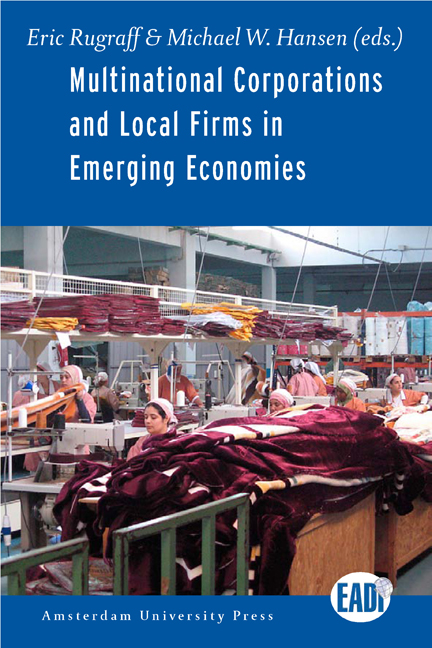1 - Multinational Corporations and Local Firms in Emerging Economies: An Introduction
Published online by Cambridge University Press: 19 January 2021
Summary
Introduction
One of the most heated issues within current development debates relates to the role played by multinational corporations (MNCs) in economic development. On the one hand, MNCs may help emerging economies1 in the modernization of their economies and industries by transferring technology, know-how and skills, by providing access to export markets, by intensifying competition, or by making available goods and services that are better and/or cheaper than those offered by local producers (De Mello, 1999; UNCTAD, 1999; JBIC Institute, 2002). On the other hand, beneficial effects are not given and MNCs may stifle economic development by locking in host economies in low value-added activities and by crowding out local investments and jobs. Furthermore, anti-competitive practices of MNCs may reduce consumer welfare and MNCs may help build consumption patterns that are unsuited for host countries (Caves, 1996; Buckley and Ghaury, 2002; Cypher and Diez, 2004).
As noted by numerous authors, at the end of the day it must be concluded that MNCs obviously are both ‘boon’ and ‘bane’ for emerging economies (Caves, 1996; Nunnenkamp, 2004; Dicken, 2004; Görg and Greenaway, 2004; Endewick, 2005) and therefore the key issue is when foreign direct investment (FDI) by MNCs is beneficial to economic development and when it is not. In this regard, the literature has pointed out numerous factors that condition FDI impacts, such as government policies (Dunning, 1997), MNC investment motives (Endewick, 2005), MNC entry strategies (Görg and Greenaway, 2004), absorptive capacity of local industry (Narula and Lall, 2004), or the extent to which MNCs link up to local firms and industries (Altenburg, 2000; Giroud and Scott-Kennel, 2006).
One of the key issues related to MNCs’ role in economic development is the way in which MNCs interact with local firms and industries. This issue is increasingly pivotal as MNCs’ role in organizing global economic activity grows and as private sector development becomes a key development priority in more and more countries. In this situation, it is crucial to ask whether and how MNCs contribute to the development of the local private sector.
- Type
- Chapter
- Information
- Publisher: Amsterdam University PressPrint publication year: 2011

